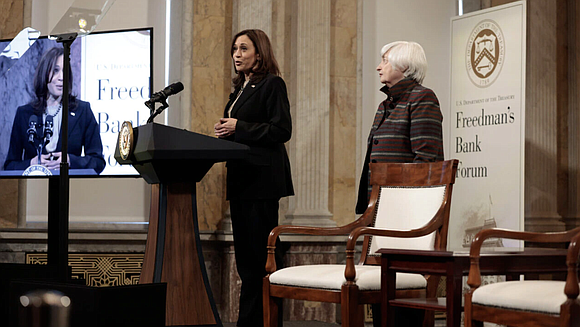Vice President Harris, Treasury Announce Billions for Black, Minority Businesses at Freedman’s Bank Forum
Style Magazine Newswire | 12/24/2021, 12:24 p.m.

By Gerren Keith Gaynor
Vice President Kamala Harris and Treasury Secretary Janet Yellen headlined the annual Freedman’s Bank Forum on Tuesday, announcing $8.7 billion in federal funding for financial institutions serving minority and underserved small business owners.
The sizable investment announced by the Office of the Vice President and U.S. Treasury Department is a part of $12 billion secured last year by Harris, when she was still a U.S. senator, along with Senators Cory Booker, Chuck Schumer, Mark Warner and U.S. Rep. Maxine Waters, chairwoman of the House Financial Services Committee.
The Jobs and Neighborhood Investment Act was intended to support community financial institutions that serve low to moderate-income and minority communities, as well as respond to the significant loss of Black-owned businesses and unemployment during the pandemic. Black-owned businesses suffered disproportionately during the pandemic, with ownership rates seeing a 41% drop between February and April 2020 — the largest rate of any racial group, according to a report by the U.S. House Small Business Committee.
Not to mention, Black-owned businesses are 20% less likely than White-owned businesses to obtain a loan from a large bank.
Since becoming the nation’s first Black vice president, Harris has worked with Secretary Yellen to implement funding programs through Community Development Financial Institutions (CDFIs) and Minority Development Institutions (MDIs) to ensure that small business owners in underserved communities can access capital in order to start and grow their businesses.
“In America today, deep racial disparities continue to hold people back from achieving all they can,” Vice President Harris said in her remarks at the forum held at the Treasury Department.
“Today, the wealth gap persists. Today, the homeownership gap persists … access to capital is unequal. Black entrepreneurs are three times more likely to report that a lack of access to capital negatively affects their profit margins. I believe that the actions we are taking, and must take, to address these disparities will define our nation’s strength and economic strength in the 21st century.”
Harris emphasized the historical context of America’s racial wealth gap as it relates to enterprise by highlighting the atrocities of the Tulsa Race Massacre, in which an angry White mob decimated the once thriving Greenwood business district, also known as Black Wall Street.
“It was designed to be a thriving community within a community and economy in which Black people supported one another, lifted one another up, and modeled excellence in which Black people could determine their own future. Some of us refer to that as self determination to put equity firmly at the center of our economic policy,” said Harris.
Noting the nation’s current low unemployment rate of 4.2% with nearly 6 million jobs being added to the economy since January, the vice president added, “We cannot take this growth for granted, and we must make sure that everyone shares some of this growth in order to sustain it.”
The Freedman’s Bank Forum is an annual conference that was instituted by former Treasury Secretary Jack Lew to address racial economic disparities. The forum gets its name from the The Freedman’s Saving and Trust Company, a private savings bank chartered by Congress in 1865, to collect deposits from the newly emancipated communities.
The Freedman’s Bank opened 37 branches in 17 states, according to the National Archives, totaling $3.7 million in assets or $80 million today after inflation. However, the Freedman’s Bank ultimately collapsed less than a decade after it was founded due to mismanagement by its executives.
Deputy Treasury Secretary Wally Adeyemo, the first Black person to serve in the role, moderated a panel at the Freedman’s Bank Forum, in which he noted, “People think about this as charity or donations when it’s not,” adding “It’s economics. Investing in these communities makes sense from an economic standpoint.”
Adeyemo noted that the challenge now is “scale.” Panelists highlighted that in order to achieve such scale, it’s also important to establish technology and data infrastructure to help support financial institutions like CDFIs and MDIs as they provide funding to generate economic growth for Black and minority-owned enterprises.
“Disproportionately many of our constituents are left to go to fast-money lenders, hot-money lenders, check-cashing places and disproportionately spend resources that they can ill afford, which can be better used by their families,” said Haskins.
Haskins thanked the Treasury Department for Harbor Bank’s receiving of $71.2 million from the funds announced this week, saying, “I’m delighted that we finally got to numbers that are realistic.” He added, “These dollars allow us to meet capital levels that the regulators require, which allows us to lend more.”



